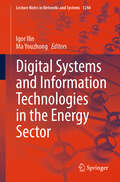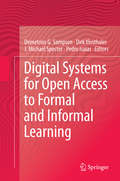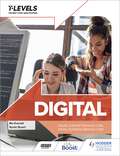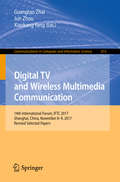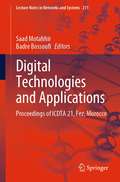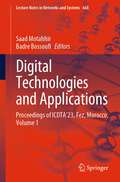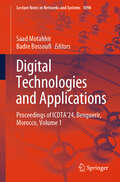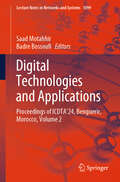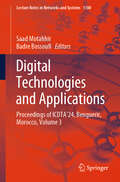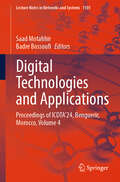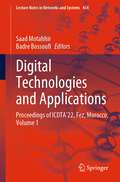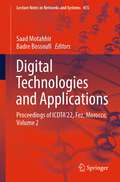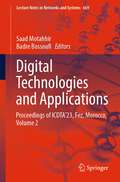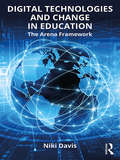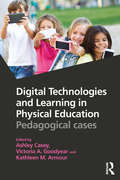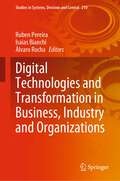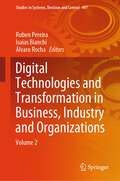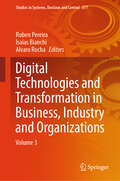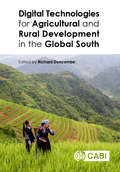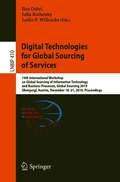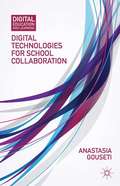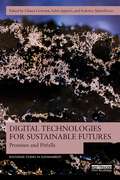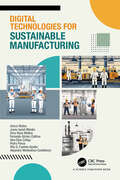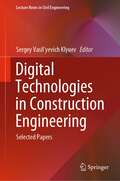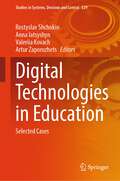- Table View
- List View
Digital Systems and Information Technologies in the Energy Sector (Lecture Notes in Networks and Systems #1244)
by Igor Ilin Ma YouzhongDigital transformation and energy transition are undoubtedly the key trends of the last decade that are fundamentally changing the way countries, regions and the global community conduct their economic activities. At first glance, these are phenomena of completely different nature. The editors and authors of the book offer a closer look at the specifics of the development of each trend, the nature of their interdependence, analyze the possibilities of coexistence, and determine the potential effects of such technological symbiosis. The book is characterized by an original, interdisciplinary statement of the problem: description of various aspects of effective interaction between elements of energy and information-technology/digital infrastructures that jointly ensure information needs and compliance with energy efficiency requirements of the modern economy. At the same time, attention is paid to each technological trend separately, as well as to the possibilities of interaction between technological capabilities of energy and digital. International author teams of professionals in different fields offer an interesting perspective on certain aspects of modern technological development of various industries. The book will be of interest to both experienced researchers, undergraduate and graduate students, and practitioners, both energy and IT specialists and even mathematicians.
Digital Systems for Open Access to Formal and Informal Learning
by Dirk Ifenthaler J. Michael Spector Pedro Isaias Demetrios G. SampsonToday, Digital Systems and Services for Technology Supported Learning and Education are recognized as the key drivers to transform the way that individuals, groups and organizations "learn" and the way to "assess learning" in 21st Century. These transformations influence: Objectives - moving from acquiring new "knowledge" to developing new and relevant "competences"; Methods - moving from "classroom" based teaching to "context-aware" personalized learning; and Assessment - moving from "life-long" degrees and certifications to "on-demand" and "in-context" accreditation of qualifications Within this context, promoting Open Access to Formal and Informal Learning, is currently a key issue in the public discourse and the global dialogue on Education, including Massive Open Online Courses (MOOCs) and Flipped School Classrooms. This volume on Digital Systems for Open Access to Formal and Informal Learning contributes to the international dialogue between researchers, technologists, practitioners and policy makers in Technology Supported Education and Learning It addresses emerging issues related with both theory and practice, as well as, methods and technologies that can support Open Access to Formal and Informal Learning In the twenty chapters contributed by international experts who are actively shaping the future of Educational Technology around the world, topics such as: - The evolution of University Open Courses in Transforming Learning - Supporting Open Access to Teaching and Learning of People with Disabilities - Assessing Student Learning in Online Courses - Digital Game-based Learning for School Education - Open Access to Virtual and Remote Labs for STEM Education - Teachers' and Schools' ICT Competence Profiling - Web-Based Education and Innovative Leadership in a K-12 International School Setting are presented. An in-depth blueprint of the promise, potential, and imminent future of the field, Digital Systems for Open Access to Formal and Informal Learning is necessary reading for researchers and practitioners, as well as, undergraduate and postgraduate students, in educational technology.
Digital T Level: Digital Support Services and Digital Business Services (Core)
by Sonia Stuart Maureen EverettTackle the core elements of the Digital Support Services or Digital Business Services T Level with this comprehensive resource.Written by highly respected authors, Mo Everett and Sonia Stuart, this clear, accessible and thorough textbook will guide learners through the key principles, concepts and terminology, as well as providing the inside track into what it takes to kick-start a career in the Digital world.- Simplify complex topics with summary tables, diagrams, key term definitions and a glossary.- Track and strengthen knowledge by using learning outcomes at the beginning of every unit and 'Test Yourself' questions.- Apply knowledge and understanding across 100s of engaging activities and research tasks.- Prepare for exams and the employer-set project using practice questions and project practice exercises.- Get ready for the workplace with industry tips and real-world examples.- Be guided through the course by expert authors Mo Everett and Sonia Stuart, who draw on their extensive industry and teaching experience.The Digital Support Services and Digital Business Services route core elements are covered in this Student Textbook. We have released the Digital Support Services pathway core elements online, for free. Visit www.hoddereducation.co.uk/digitalsupportservices/pathwaycore to learn more.
Digital TV and Wireless Multimedia Communication
by Jun Zhou Xiaokang Yang Guangtao ZhaiThis book presents revised selected papers from the 14th International Forum on Digital TV and Wireless Multimedia Communication, IFTC 2017, held in Shanghai, China, in November 2017. The 46 papers presented in this volume were carefully reviewed and selected from 122 submissions. They were organized in topical sections named: image processing; machine learning; quality assessment; social media; telecommunications; video surveillance; virtual reality; computer vision; and image compression.
Digital Technologies and Applications: Proceedings of ICDTA 21, Fez, Morocco (Lecture Notes in Networks and Systems #211)
by Saad Motahhir Badre BossoufiThis book gathers selected research papers presented at the First International Conference on Digital Technologies and Applications (ICDTA 21), held at Sidi Mohamed Ben Abdellah University, Fez, Morocco, on 29–30 January 2021. highlighting the latest innovations in digital technologies as: artificial intelligence, Internet of things, embedded systems, network technology, information processing, and their applications in several areas such as hybrid vehicles, renewable energy, robotic, and COVID-19. The respective papers encourage and inspire researchers, industry professionals, and policymakers to put these methods into practice.
Digital Technologies and Applications: Proceedings of ICDTA'23, Fez, Morocco, Volume 1 (Lecture Notes in Networks and Systems #668)
by Saad Motahhir Badre BossoufiThis book presents volume 1 of selected research papers presented at the third International Conference on Digital Technologies and Applications (ICDTA 23). This book highlights the latest innovations in digital technologies as: artificial intelligence, Internet of things, embedded systems, network technology, digital transformation and their applications in several areas as Industry 4.0, renewable energy, mechatronics, digital healthcare. The respective papers encourage and inspire researchers, industry professionals, and policymakers to put these methods into practice.
Digital Technologies and Applications: Proceedings of ICDTA'24, Benguerir, Morocco, Volume 1 (Lecture Notes in Networks and Systems #1098)
by Saad Motahhir Badre BossoufiThis book presents volume 1 of selected research papers presented at the fourth International Conference on Digital Technologies and Applications (ICDTA’24). Highlighting the latest innovations in digital technologies as: artificial intelligence, Internet of Things, embedded systems, chatbot, network technology, digital transformation and their applications in several areas as Industry 4.0, sustainability, energy transition, and healthcare, the book encourages and inspires researchers, industry professionals, and policymakers to put these methods into practice.
Digital Technologies and Applications: Proceedings of ICDTA'24, Benguerir, Morocco, Volume 2 (Lecture Notes in Networks and Systems #1099)
by Saad Motahhir Badre BossoufiThis book presents volume 2 of selected research papers presented at the fourth International Conference on Digital Technologies and Applications (ICDTA’24). Highlighting the latest innovations in digital technologies as: artificial intelligence, Internet of Things, embedded systems, chatbot, network technology, digital transformation and their applications in several areas as Industry 4.0, sustainability, energy transition, and healthcare, the book encourages and inspires researchers, industry professionals, and policymakers to put these methods into practice.
Digital Technologies and Applications: Proceedings of ICDTA'24, Benguerir, Morocco, Volume 3 (Lecture Notes in Networks and Systems #1100)
by Saad Motahhir Badre BossoufiThis book presents volume 3 of selected research papers presented at the fourth International Conference on Digital Technologies and Applications (ICDTA’24). Highlighting the latest innovations in digital technologies as: artificial intelligence, Internet of Things, embedded systems, chatbot, network technology, digital transformation and their applications in several areas as Industry 4.0, sustainability, energy transition, and healthcare, the book encourages and inspires researchers, industry professionals, and policymakers to put these methods into practice.
Digital Technologies and Applications: Proceedings of ICDTA'24, Benguerir, Morocco, Volume 4 (Lecture Notes in Networks and Systems #1101)
by Saad Motahhir Badre BossoufiThis book presents volume 4 of selected research papers presented at the fourth International Conference on Digital Technologies and Applications (ICDTA’24). Highlighting the latest innovations in digital technologies as: artificial intelligence, Internet of Things, embedded systems, chatbot, network technology, digital transformation and their applications in several areas as Industry 4.0, sustainability, energy transition, and healthcare, the book encourages and inspires researchers, industry professionals, and policymakers to put these methods into practice.
Digital Technologies and Applications: Proceedings of ICDTA’22, Fez, Morocco, Volume 1 (Lecture Notes in Networks and Systems #454)
by Saad Motahhir Badre BossoufiThis book presents Volume 1 of selected research papers presented at the Second International Conference on Digital Technologies and Applications (ICDTA 22), held at Sidi Mohamed Ben Abdellah University, Fez, Morocco, on January 28–29, 2022. This book highlights the latest innovations in digital technologies as: artificial intelligence, Internet of Things, embedded systems, network technology, information processing and their applications in several areas as hybrid vehicles, renewable energy, mechatronics, medicine… This book will encourage and inspire researchers, industry professionals, and policymakers to put these methods into practice.
Digital Technologies and Applications: Proceedings of ICDTA’22, Fez, Morocco, Volume 2 (Lecture Notes in Networks and Systems #455)
by Saad Motahhir Badre BossoufiThis book presents volume 2 of selected research papers presented at the Second International Conference on Digital Technologies and Applications (ICDTA 22), held at Sidi Mohamed Ben Abdellah University, Fez, Morocco, on 28–29 January 2022. Highlighting the latest innovations in digital technologies as: Artifiscial Intelligence, Internet of things, Embedded systems, Network Technology, information processing and their applications in several areas as hybrid vehicles, renewable energy, Mechatronics, Medicine… The respective papers will encourage and inspire researchers, industry professionals, and policymakers to put these methods into practice.
Digital Technologies and Applications: Proceedings of ICDTA’23, Fez, Morocco, Volume 2 (Lecture Notes in Networks and Systems #669)
by Saad Motahhir Badre BossoufiThis book presents volume 2 of selected research papers presented at the Second International Conference on Digital Technologies and Applications (ICDTA 23). This book highlights the latest innovations in digital technologies as artificial intelligence, Internet of Things, embedded systems, network technology, digital transformation, and their applications in several areas as Industry 4.0, renewable energy, mechatronics, digital healthcare, etc. The respective papers encourage and inspire researchers, industry professionals, and policymakers to put these methods into practice.
Digital Technologies and Change in Education: The Arena Framework
by Niki DavisDigital Technologies and Change in Education provides professionals and other leaders with a road map of the processes of change for teachers, schools, universities, and educational systems, including extensive case studies and evidence that clarify the benefits and challenges of digital technologies in education. To this end, Niki Davis offers a theoretical framework—the Arena—as a tool for exploration and analysis of our own experiences of teaching, leadership, and research. With a blend of local, regional, and global examples from all sectors of education, this book allows readers to move past the potentially misleading glitter of new technologies and into the co-evolving ecologies that make up education and training locally and globally.
Digital Technologies and Learning in Physical Education: Pedagogical cases
by Ashley Casey, Victoria A. Goodyear and Kathleen M. ArmourThere is evidence of considerable growth in the availability and use of digital technologies in physical education. Yet, we have scant knowledge about how technologies are being used by teachers, and whether or how these technologies are optimising student learning. This book makes a novel contribution by focusing on the ways in which teachers and teacher educators are attempting to use digital technologies in PE. The book has been created using the innovative ‘pedagogical cases’ framework. Each case centres on a narrative, written by a PE practitioner, explaining how and why technology is used in their practice to advance and accelerate learning. Each practitioner narrative is then analysed by a team of experts from different disciplines. The aim is to offer a multi-dimensional understanding of the possibilities and challenges of supporting young people’s learning with digital technologies. Each case concludes with a practitioner reflection to illustrate the links between theory, research and practice. Digital Technologies and Learning in Physical Education encourages critical reflection on the use of technologies in PE. It is an essential resource for students on physical education, kinesiology or sport science courses, practitioners working in PE or youth sport, and researchers interested in digital technologies and education.
Digital Technologies and Transformation in Business, Industry and Organizations (Studies in Systems, Decision and Control #210)
by Álvaro Rocha Ruben Pereira Isaias BianchiThis book intends to provide a reference manual to assist professionals and academics on further insights regarding: the impact of digital technologies in business, how to implement digital technologies, solutions for specific digital technologies barriers, and much more. Digital transformation marks a rethinking of how an organization uses technology, people, and processes in pursuit of new business models and new revenue streams, driven by changes in customer expectations around products and services. For many enterprises that build traditional goods, this means building digital products, such as a mobile applications or an ecommerce platform. To do so, they must use and integrate digital technologies. The pace of change is increasing. Organizations need to adapt or risk to disappear under innovators entrance in the market. With new digital technologies growing in an exponential rate in the last few decades, organizations are facing even more complex contexts. Managers are now pressed to take efficient decisions. The editors encourage the use of research methods such as Systematic Literature Review (SLR) or Multivocal Literature Review (MLR) (since many new technologies are usually evolved first by practitioners). However, other research methods can also be appreciated as case studies or experiments.
Digital Technologies and Transformation in Business, Industry and Organizations: Volume 2 (Studies in Systems, Decision and Control #497)
by Álvaro Rocha Ruben Pereira Isaias BianchiGiven the nature of this book proposal, linked with some Masters, and the faster pace of digital technologies evolution, the new version will have an entire new content with new cases and insights regarding the development and implementation of the most interesting digital technologies. Digital transformation marks a rethinking of how an organization uses technology, people, and processes in pursuit of new business models and new revenue streams, driven by changes in customer expectations around products and services. For many enterprises that build traditional goods, this means building digital products, such as a mobile applications or an ecommerce platform. To do so, they must use and integrate digital technologies. The pace of change is increasing. Organizations need to adapt or risk disappearing under innovators entrance in the market. With new digital technologies growing in an exponential rate in the last few decades, organizations are facing even more complex contexts. Managers are now pressed to take efficient decisions. This book provides a reference manual to assist professionals and academics on further insights regarding: the impact of digital technologies in business, how to implement digital technologies, solutions for specific digital technologies barriers, and much more. This book covers research methods such as Systematic Literature Review (SLR) or Multifocal Literature Review (MLR), case studies, experiments, survey, Design Science Research using quantitative and qualitative approaches.
Digital Technologies and Transformation in Business, Industry and Organizations: Volume 3 (Studies in Systems, Decision and Control #577)
by Alvaro Rocha Ruben Pereira Isaias BianchiThis book covers research methods such as Systematic Literature Review (SLR) or Multifocal Literature Review (MLR), case studies, experiments, surveys, and Design Science Research using quantitative and qualitative approaches. This proposal is the third volume of the already edited and published book “Digital Technologies and Transformation in Business, Industry and Organizations.” Given the nature of this book proposal, linked with some Masters, and the faster pace of digital technologies evolution, the new version will have an entire new content with new cases and insights regarding the development and implementation of the most interesting digital technologies. Digital transformation marks a rethinking of how an organization uses technology, people, and processes in pursuit of new business models and new revenue streams, driven by changes in customer expectations around products and services. For many enterprises that build traditional goods, this means building digital products, such as a mobile application or an e-commerce platform. To do so, they must use and integrate digital technologies. The pace of change is increasing. Organizations need to adapt or risk disappearing under innovators entrance in the market. With new digital technologies growing in an exponential rate in the last few decades, organizations are facing even more complex contexts. Managers are now pressed to take efficient decisions. This book provides a reference manual to assist professionals and academics on further insights regarding: the impact of digital technologies in business, how to implement digital technologies, solutions for specific digital technologies barriers, and much more.
Digital Technologies for Agricultural and Rural Development in the Global South
by Richard DuncombeThis book shares research and practice on current trends in digital technology for agricultural and rural development in the Global South. Growth of research in this field has been slower than the pace of change for practitioners, particularly in bringing socio-technical views of information technology and agricultural development perspectives together. The contents are therefore structured around three main themes: sharing information and knowledge for agricultural development, information and knowledge intermediaries, and facilitating change in agricultural systems and settings. The book includes: -Views from diverse academic disciplines as well as practitioners with experience of implementing mobile applications and agriculture information systems in differing country contexts. -Case studies from a range of developing countries and information from across the public and private sector. -A set of practitioner guidelines for successful implementation of digital technologies. With contributions reaching beyond just a technological perspective, the book also provides a consideration of social and cultural factors and new forms of organization and institutional change in agricultural and rural settings. An invaluable read for researchers in international development, socio-economics and agriculture, it forms a useful resource for practitioners working in the area.
Digital Technologies for Global Sourcing of Services: 14th International Workshop on Global Sourcing of Information Technology and Business Processes, Global Sourcing 2019, Obergurgl, Austria, December 18–21, 2019, Proceedings (Lecture Notes in Business Information Processing #410)
by Julia Kotlarsky Ilan Oshri Leslie P. WillcocksThis book constitutes revised selected papers from the 14th International Global Sourcing Workshop 2019, held in Obergurgl, Austria, in December 2019. The 10 contributions included were carefully reviewed and selected from a total of 36 submissions.The book offers a review of the key topics in sourcing of services, populated with practical frameworks that serve as a tool kit to students and managers. The range of topics covered in this book is wide and diverse, offering various perspectives on the employment of digital technologies in the context of sourcing services. More specifically the book examines sourcing decisions and management practices around digital platforms, robotic process automation and blockchain, giving specific attention to digital aspects of innovation in sourcing.
Digital Technologies for School Collaboration
by Anastasia GousetiWeb-based school collaboration has attracted the sustained attention of educators, policy-makers, and governmental bodies around the world during the past decade. This book sheds new light on this topical but ever so complex issue. Drawing on a wealth of theoretical and empirical work, it presents the various models of available school twinning programs and explores the cultural, political, and economic factors that surround the recent enthusiasm regarding collaborative initiatives. Moreover, the book critically examines teachers' and students' experiences of web-based school collaboration. In particular, it develops a realistic perspective of the range of challenges they face and identifies the host of technological and non-technological issues that can shape participation in collaborative programs.
Digital Technologies for Sustainable Futures: Promises and Pitfalls (Routledge Studies in Sustainability)
by Chiara Certomà Fabio Iapaolo Federico MartellozzoThis book critically examines the interplay between digitalization and sustainability. Amid escalating environmental crises, some of which are now irreversible, there is a noticeable commitment within both international and domestic policy agendas to employ digital technologies in pursuit of sustainability goals.This collection gathers a multitude of voices interrogating the premise that increased digitalization automatically contributes to greater sustainability. By exploring the planetary links underpinning the global digital economy, the book exposes the extractive logics ingrained within digital capitalism and introduces alternatives like digital degrowth and the circular economy as viable, sustainable paths for the digital era. Through a combination of theoretical reflections and detailed contextual analyses from Italy, New Zealand, and the UK—including initiatives in participatory planning and technology co-design—it articulates the dual role of digital technology: its potential to support socio-economic and environmental sustainability, while also generating conflicts and impasses that undermine these very objectives. Offering fresh insights into power disparities, exclusionary tactics, and systemic injustices that digital solutionism fails to address, this volume also serves as a reminder that sustainability extends beyond climate-related issues, underscoring the inseparability of environmental discourse from wider social justice considerations.Aimed at a diverse readership, this volume will prove valuable for students, researchers, and practitioners across various fields, including Geography, Urban Studies, Sustainability Studies, Environmental Media Studies, Critical AI Studies, Innovation Studies, and the Digital Humanities.
Digital Technologies for Sustainable Manufacturing
by Arturo Molina Pedro Ponce Alex Elías Zúñiga Dora Iliana Medina Fernando Gómez Zaldívar Juana Isabel Méndez Rita Q. Fuentes-Aguilar Alejandro Montesinos-CastellanosDigital Technologies for Sustainable Manufacturing provides a practical framework for promoting sustainability in manufacturing by combining Life Cycle Engineering with the 5S principles (Social, Sustainable, Sensing, Smart, and Safe). This book introduces ten core digital technologies—including AI, simulation tools, IoT, digital twins, additive manufacturing, CAD tools, blockchain, cloud computing, AR/VR, and robotics and automation—as vital drivers for fostering innovation and resilience across materials, products, processes, manufacturing systems, and supply chains. Each chapter blends theory with real-world case studies and shows how competitive intelligence helps stakeholders anticipate trends and make strategic decisions. This comprehensive book prepares engineers, scientists, and leaders to create a more sustainable, efficient, and future-ready manufacturing ecosystem.
Digital Technologies in Construction Engineering: Selected Papers (Lecture Notes in Civil Engineering #173)
by Sergey Vasil’yevich KlyuevThis book gathers the latest advances, innovations, and applications in the field of construction engineering, as presented by researchers and engineers at the Digital Technologies in Construction Engineering conference, held in Belgorod, Russia, on June 8-9, 2021. It covers highly diverse topics, including industrial and civil construction, building materials; environmental engineering and protection; sustainability; structure safety and special construction structures. The contributions, which were selected by means of a rigorous international peer-review process, highlight numerous exciting ideas that will spur novel research directions and foster multidisciplinary collaborations.
Digital Technologies in Education: Selected Cases (Studies in Systems, Decision and Control #529)
by Artur Zaporozhets Valeriia Kovach Rostyslav Shchokin Anna IatsyshynAmong the technologies that significantly change the modern world of human existence, it is worth mentioning, first of all, digital technologies. These technologies are actively and relentlessly implemented and integrated into all spheres of human activity and society, becoming a powerful catalyst and a determining source of social development. According to such a scenario of development, society acquires the features of digital, thus defining digital technologies as its leading technology. This process is called the digital transformation of society. The wide use of digital technologies to provide free access to information and knowledge is a basic principle of the digital society. Digital society significantly changes traditional ideas about work, education, culture, communication, social and political life. The development of citizens' digital culture is the main condition for the successful construction of a digital society. Therefore, it is important to carry out scientific research and targeted training to improve the qualifications of specialists in various branches of the economy, in particular, educators and scientists to acquire digital competence. After all, these specialists are key figures in ensuring the process of digitalization of education and science. The book presents various aspects of the digital transformation of education and science. A comprehensive view of the current state and prospects of the use of digital technologies for education and science is provided. The experience of using digital technologies and tools for training and improving the qualifications of specialists of various specialties, as well as for the preparation of future PhDs, is described. The book is addressed to education workers, managers, scientists, graduate students, librarians, and all those who are interested in the process of digital transformation of education and science.
